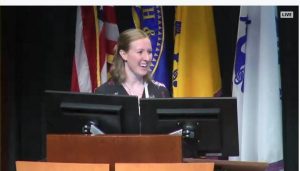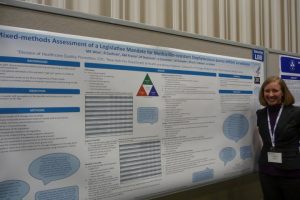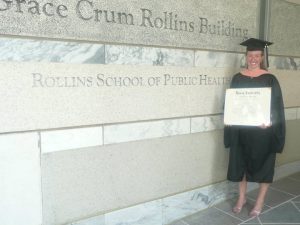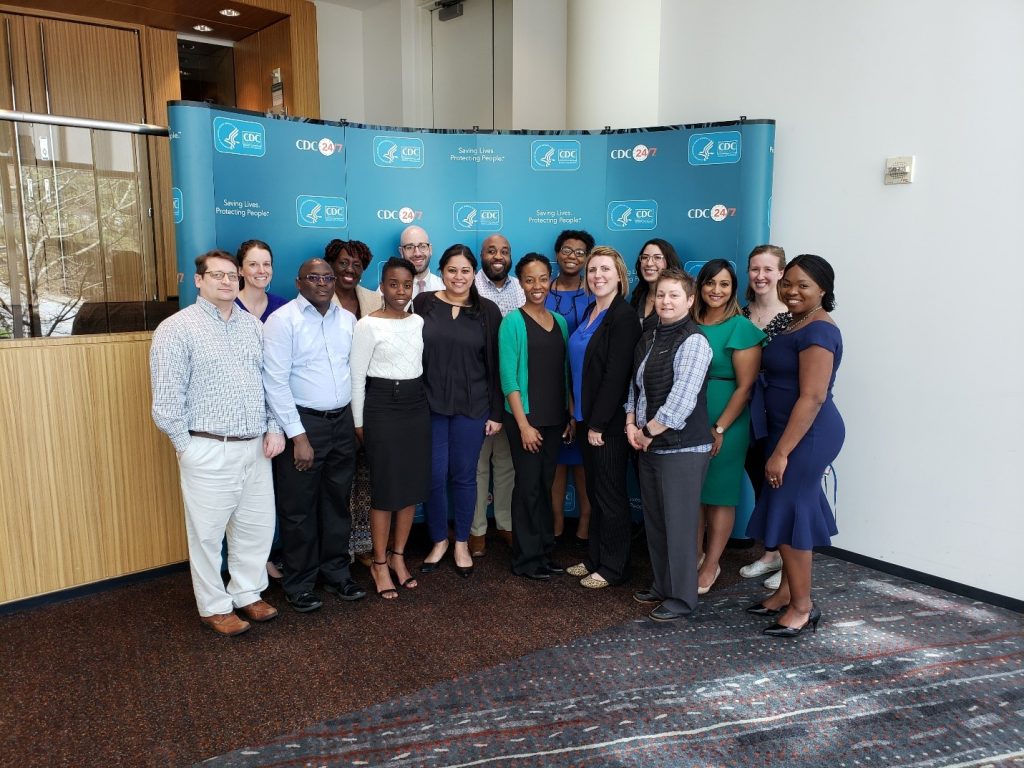Public Health Analyst Series: Amy’s Journey

Presenting at the NHSN Annual Training, 2019
As a teen, when people asked what I wanted to be when I grew up, I always said a doctor. In high school, my favorite classes were biology and human anatomy, and I enjoyed listening to and helping people. As a summer lifeguard, I enjoyed the feeling of saving lives and keeping people safe. (Yes, I did actually save people during my tenure! Learning to swim is a life-saving skill!) Becoming a doctor seemed like a logical career path.
To meet a general education requirement in my freshman year of college, I took an Introduction to Psychology class. I was fascinated by the mind, human behavior, and using the principles of psychology to help explain why people do what they do. The following year I took Psychology of Health and Illness, and I was hooked. From that point on, I wanted to focus more on why people did what they did, especially as it related to their health and well-being.
The summer between my junior and senior year, with the encouragement of my college advisor, I worked as an unpaid intern with the Iowa Department of Public Health (IDPH) and the Northeast Iowa Food and Fitness Initiative. Over the course of eight weeks, from the comfort of my own home (this was also my first foray into remote working!), I gathered health statistics from various public health data sources for five counties in northeast Iowa to use as a starting point to assess the overall health of the region. Through this work, my worldview expanded from person-centered health (doctor/patient relationship) to population-centered health (public/personal health). At the conclusion of my internship, I traveled to IDPH to meet my supervisor in person, and she introduced me to many other areas of public health. I was drawn to the breadth and depth of the public health field as well as its ability to affect the health of communities.

My very first conference poster presented in 2010 at the fifth decennial International Conference on Healthcare-Associated Infections in Atlanta, GA.
After college, I attended the Rollins School of Public Health at Emory University, focusing on Behavioral Science and Health Education. I loved everything about my classes at Rollins including learning to appreciate the science behind how individuals make health-related decisions and how public health initiatives improve health at all levels. I won a coveted work-study position at the CDC working with a Behavioral Scientist in the Division of Healthcare Quality Promotion (DHQP), which gave me my first experience working in the field of healthcare quality. As a public health nerd, few things are cooler than getting to walk onto the CDC campus and work side-by-side with the folks leading the public health field in the US!

Graduation from Rollins School of Public Health, 2011
After getting my Master of Public Health (MPH) degree at Rollins, I continued working with DHQP and transitioned into a Public Health Analyst role working with the National Healthcare Safety Network (NHSN). In my current role with Lantana, I am a subject matter expert for NHSN’s Antimicrobial Use and Resistance (AUR) Module. I continue to use my public health skills daily, providing direct NHSN user education in the form of webinars, email correspondence, and educational materials in multiple formats to meet the wide range of learning styles. I help to develop and maintain the AUR Module protocol and business requirements so that AUR data can be submitted to NHSN using a standardized format. Data reported into the AUR Module work at three levels: it guides CDC and state-level initiatives and provides data at the facility-level to improve prescribing practices and patient care.

Beyond my project work, I also co-lead Lantana’s Public Health Interest Group (PHIG). All Lantana folks interested in public health, regardless of the projects they work on, are welcome to attend and contribute. The group meets quarterly to discuss public health current events and hot topics to keep on Lantana’s radar. We review upcoming conferences, identify professional development opportunities, and share our experience to expand the group’s public health knowledge. PHIG’s vision is to create a public health brain trust at Lantana. As you can see by our Public Health Analyst blog, we’re well on our way!
